With Lots O’ LibrePlanet Pics!
It was like a roundhouse punch to the side of the head from the Good News Fairy — the news that Reglue was chosen for the Free Software Foundation’s (FSF) Award for Projects of Social Benefit to be handed-out in Cambridge at LibrePlanet.
At MIT, the conference venue, I was also surprised by the large attendance, but more than that, by the number of people who traveled across oceans to be there. Beforehand, I received emails from Venezuela, South Africa, all parts of the EU, and one from Georgia. And no, not the Georgia bordering Tennessee.
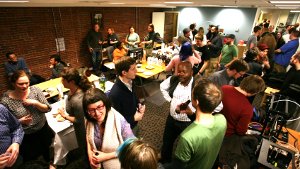
At Reglue, the “free as in freedom” aspect is of particular importance. If we are going to present our Reglue kids with Linux or Linux-based computers, then we have a responsibility to teach them that they have a choice in what they install. When they put software on their computers they will, more times than not, find software that not only does the job they want it to do, but which allows them to see how it does that job. And if it doesn’t do that job to their liking, they or someone who codes can change it. That is a big, big, big deal. Yeah, that’s right…that big deal rates three “bigs.”
To a kid who already has an aptitude or interest in computer science, this opens a whole new world of opportunity for her. She steps not only into a career of her choice, she steps into a community of millions of free software programmers and users. She has her eyes opened to the concept of community and purpose…and the reality that she can make a difference as well as a paycheck.
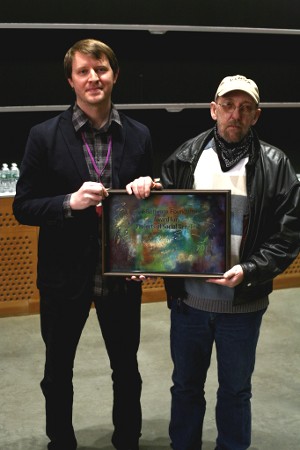
Awards and accolades aside, it was an honor just to attend LibrePlanet 2015. It gave me a chance to talk to some amazing people. To engage free software movers and shakers in conversation and banter alone was worth the trip. And the really good part? I was able to tell them how much some of this Free Open Source Software sucks.
Wow. This lovefest just took a nosedive, didn’t it?
Of course I didn’t say their software sucks. I merely opened a conversation with them as to how to go about getting the software that does suck fixed. That’s a question without an easy answer…a problem without an easy solution.
Why? Because the software author released the code to the public after it was finished’ with the caveat being that itt was finished when it did what the author programmed it to do…and nothing more. That in itself is a huge thing. The guy could have really been an asshat and not published his application at all. But to those that do…
So, what is the big deal if you had to use a script to engage the program? So what if you had to go out and pull in features or dependencies from other applications? So what if he didn’t provide any timely how to or other documentation to help you get it to work? He’s not obliged to do so, not in the least. The software was written to do what he needed it to do. He released it under the GPL, so if it didn’t work for you, then you could fix it or find someone to fix it for you. In for a penny or pound, it’s what you get.
I didn’t tell them their software sucked, but I told them about the sorry, smelly, not so daisy-fresh mess that text to speech software is in the Linuxsphere. I told them that there are literally millions of users around the world who are waiting on easier instructions or installations.
They are waiting for software that can change their lives.
Let me repeat: There are literally millions of users around the world, waiting on easier instructions or installations for TTS software. They are waiting for software that can change their lives.
There’s an 80 year old lady who lives three stories high in a New Delhi ghetto, who has to navigate steep, unsure stairs in order to get the dinner a friend has brought to her. There are kids in Buenos Aires, born into the slum, with birth defects so severe that they cannot speak and have to write everything on the back of a Dell computer box in the family room. And yeah, there is this guy in Texas who voluntarily had his larynx removed so he didn’t die before his job was finished.
We’ve documented the problems with various components of Linux-based text to speech software. It was a glum assessment, and I am being polite.
Don’t believe me? Then try installing text to speech software in Linux yourself. I’ll guarantee that your inner dialog will sound something like this:
“Is it Espeak that I need to install first or is it Gespeak? Which one is the GUI? And why do the ‘voices,’ the software that actually does the talking, have to be installed in an application separately? Okay, so I installed it as instructed but it’s telling me that the voices are not in the correct file path. Yes, they are — they most certainly fricking are. I put them exactly where you told me to put them. Oh, now I found it — it says that the path had been changed but it wasn’t published with or in any new documentation.
“FrickFrickFrickFrickFrickFrickFrickFrickFrickFrick FRICK’IN FRICK
“And now there’s a post from some mailing list that says the voice files actually need to be in another directory entirely.”
Lather, rinse, repeat.
By now, your eyes have glazed over and you begin to consider the substance abuse options at your immediate disposal. Maybe it’s time to evaluate software other than this garbage.
Festival? That sounds, uh…festive. Let’s give that a try. I mean, with a name like “Festival” it has to be good, right?
Oh that noise? That was the sound of my Diety-forsaken fricking monitor crashing through my fricking office window. You have to be kidding, right? I’m a new Linux user and I am looking for a text to speech application that will help me speak synthetically when I can’t speak naturally. And you want me to do this? This is what I have to do to get your text to speech application working?
Step 2: Create the batch file for talking.
You need to use an editor such as gedit to create a file called talk.sh.In GNOME on the menu at Applications > Accessories > gedit Text Editor
or
use the command line$ gedit ~/talk.sh &
talk.sh
[code]
###################################################################
#
# Talking script
#
#————————–
# get words to talk
szAnswer=$(zenity –entry –text “What do you want the computer to say?” )
#————————–
# Say words.
echo $szAnswer | festival –tts
#————————–
# done
[/code]Save the file.
Make the file executable:
$ chmod +x talk.sh
I have to follow those instructions to get your application to work? I can’t remember when I was so angry or so driven to replace the smooth, kind-sounding word “frick” with the real thing. You got to be kidding me. Really? This is “the solution” for text to speech with Linux?
It might as well be text to speech with trigonometry vector calculations.
OK. I get it alright, I understand. Your itch is scratched and you’ve washed your hands of it and walked away. Wonderful public service. Thank you. But let’s talk dollars. Let’s say you are offered the money to make this friggin’ application usable to the other 99 percent of the people that could really use it. I’m not just speaking to Festival authors. I’m talking about the people who released apps like Gspeak and other TTS applications. What would it take in dollars and cents to get it up and running? I mean, without taking advanced math courses in order to just get your application working.
Or for that matter, what incentive would be enough for the young, just-starting-out programmer to pick up where this left off?
So, I’ll fess up. Until I had this problem, I didn’t give a flying crap about text to speech applications in Linux. I didn’t care how bad they were or how complex getting them usable was. But now I do, and maybe there’s a reason for it. Maybe there’s an old lady in India who would rather call out to the vendor downstairs via her open window to come up instead of leaving dinner at the door for her to pick up. A crippled 80 year old woman shouldn’t have to navigate treacherous stairs in order to have her daily meal.
Maybe there’s an eleven year old boy with a condition that won’t allow him to speak. He watches from his seat on the street corner as kids his age play a game of football or cricket or shuffle board…a boy who only wants to be able to take part in his own childhood.
 Is that software done to your satisfaction now? Unfortunately it probably is. And that places me beyond angry. It drops me off in a despairingly dingy and cold corner of the human condition. It leaves me feeling empty inside, knowing there is nothing I can do personally to fix this. I can reach the entitiy that will solve this condition but with a clown’s nose and honka-honka horn, he teases me by jumping back and urging me to catch him.
Is that software done to your satisfaction now? Unfortunately it probably is. And that places me beyond angry. It drops me off in a despairingly dingy and cold corner of the human condition. It leaves me feeling empty inside, knowing there is nothing I can do personally to fix this. I can reach the entitiy that will solve this condition but with a clown’s nose and honka-honka horn, he teases me by jumping back and urging me to catch him.
Honka-honka.
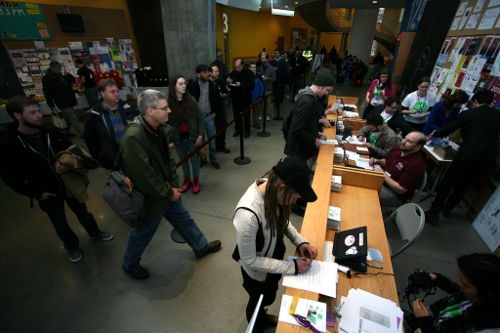
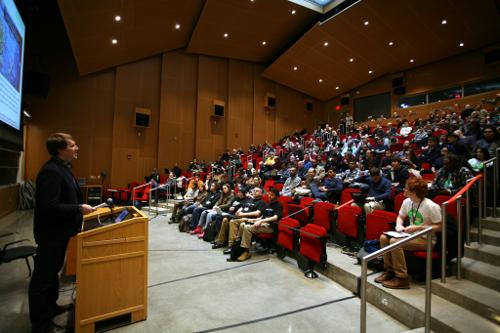
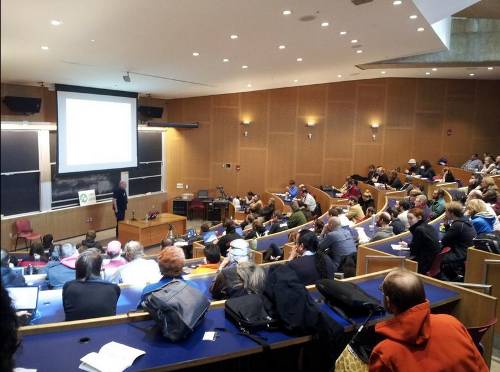
Ken Starks is the founder of the Helios Project and Reglue, which for 20 years provided refurbished older computers running Linux to disadvantaged school kids, as well as providing digital help for senior citizens, in the Austin, Texas area. He was a columnist for FOSS Force from 2013-2016, and remains part of our family. Follow him on Twitter: @Reglue


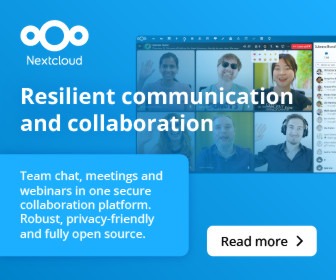





Uncle Ken, I have some serious metal tools, sharp ones
that you can use to prod some devs/coders into submission?
This Linux/FOSS or FOSS/Linux free super-software should
be solving world problems. Helping people who could use
a cheap tool to make life less sucky. DARPA could take a
day or two off from making killing machines and do this
text to speech thingy, they would not even break a sweat.
Or how about if we do a fundraiser to hire a couple of
cleaver software mechanics to work full time on this?
I may not code but I have $50 to start the project!
And pat yourself on the back for the great post.
As long as we let lawyers set up extremist licensing we will only have monopolists (hawking software that works as badly as possible) and irresponsible unmotivated hackers as you describe. Neither proprietary nor GPL inherently form a robust market platform.
Okay, Colonel, you’re on. I’m in for $100. Somebody figure out who will collect it (maybe Reglue’s treasurer? I don’t know) and publish the address.
I had a chance most of the readers here didn’t. I sent Ken an email back in November warning him that I was coming down so he could give me a good talking to. It was worth it and we had a pleasant time or two. And it was a privilege to be one of the people who had heard his voice (the old one) up close.
Now–how do we figure out whether money will do what we need for this project, and how much money? Open source programmers have to eat, make house payments, light bill, shoes, and all the other stuff you and I have to do, so we need to consider that in the plan.
Help?
“You can’t always get what you want, but sometimes you can get what you need..” Rolling Stones.
Ken, I’m sure by now you know much more about TTS than most, but I’ll vent my opinion anyway.
For starters, sorry to say that but, often F/OSS arrives later. Reasons for that are:
1. Some innovator is trying to make money and didn’t decide to GPL the invention — yet;
2. It’s a field that requires lots of research money, but F/OSS will replicate things once ideas have stabilized (e.g. Google Maps/ Open Street Maps);
3. There’s not a big users “critical mass” to even make communities.
So probably you’ll need to lower your standards and:
a. start with a not-so-free proprietary solution;
b. don’t use our dear free OS but accept something else and
c. search for larger groups of users.
Right off the bat, I’d say a desktop (or a server BTW) are not the places to start looking; instead look for solution in smartphones (or tablets). Google or Apple might have the means to do some pioneer research. Even Microsoft has researched the subject with good results, I seem to recall.
Why not a desktop? Supposedly, a talking desktop does not help much while a portable device can be useful where it’s needed. Also, it’s hard to get money enough to pay the development, but millions of people buying an Android app might make it work.
Last but not least, there’s a lot of people who can’t talk. They are perfectly equipped to do it and yet they cannot do it. That happens when you must talk in an alien language. German is hard not just because of grammar, but also because they use phonemes my language doesn’t have.
But you can team up with people who will use apps on a smartphone to translate/talk in another language. Fortunately (for you) voice recognition is the harder part, TTS is easier.
I too want a F/OSS application to do it, but then I also want a Linux smartphone — and Ubuntu or Jolla simply don’t sell over here.
There’s also another group of people wanting TTS, and they do it just for fun. There’s a kind of software called Vocaloid made with the aim of giving voice to singing fictional characters. It usually works by using pre-sampled voice snippets. Quality is still a problem, much of the effort is directed towards Japanese synthesis and obviously singing is not speaking. But it might be useful as another front of research.
Be somewhat creative. Some years ago, someone did a mashup using words pronounced from a dictionary to “sing” “Don’t go breaking my heart”. It was more fun than realistic, but for speeches one has to aim low: just make sure to write very boring speeches. Nobody notices a bad TTS while sleeping… 😛
Ed, we’re going to use the Reglue non profit paypal account for this. One, it’s already established and two, there’s a good chance that the developer we end up working with will have a pay pal account so we can just transfer funds. That’s to my thinkin’ anyway.
Unbeknownst…Text to speech is fairly well covered on the droid market. I use an app called speech assistant that runs circles around anything out there. And of course there is a paid edition. I think it set me back a bazillion or so. JK…3 bucks US is what I paid. It’s a bit cumbersome at first but as with any app, the more you fiddle around with it, the easier it becomes. I find the ability to set it up on the user side to be the killer deal. You can do everything I can think of with a real time text to speech app. It has the ability to type something in the speak field and hit save to phrase and it’s there for as long as you call upon it to say.
But to the point at hand. I’ve worked with speech challenged kids for almost a decade now and I promise you…the TTS on the desktop is greatly needed. What we are attempting to do is go to Developer A and ask “what keeps you from making your app as good as (pick any online service for their voices). Then we have the problems from a developer perspective and not some whiny end user that has no clue what the developer goes through to write his software. Hopefully that tact will pan out for us.